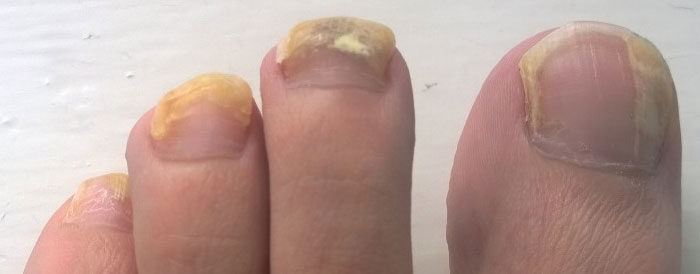
What the color of your toenails can tell you about your health
Whether you’re washing your hands or admiring a manicure, you spend a lot more time looking at your fingernails than your toenails. Maybe it’s time to focus on your feet more often (and not just during sandal season). Toenail color changes — from a big blue spot to a thin brown line — could signal health problems. Here’s what you need to know.
Why Do Toenails Turn Black, Green, and Other Colors? Watch for these shades to know if you need to talk to your doctor.
Black Toenail: Common Causes
If your toenail turns black, it’s most likely a bruise under the nail, technically called a subungual hematoma. You can get it from stubbing a toe or from footwear that cram your feet into the front of the shoe. The bruise usually starts out red, then becomes purple, dark brown, and finally black when blood beneath the nail pools and clots. Expect your black toenail to grow out in about 6 to 9 months or longer.
Black toenail: Rare causes
Say you’re not a runner, your shoes are roomy, and you’re sure you haven’t hurt your toe — yet you have one or more black toenails. Check to see if it’s just that dye has rubbed off from a pair of shoes. If not, head to the doctor. You might have a rare cause of black toenail, such as:
- Malignant melanoma, a serious form of skin cancer
- Fungal infection
- Chronic ingrown nail
- Other health problems
All-yellow Toenails
When toenails turn yellow, a fungus is usually to blame. This type of fungal infection is so common that you might not even need to see a doctor for treatment. Try an over-the-counter antifungal cream. If your nail is yellow and thick, gently file down the surface so that the drug can reach deeper layers. If at-home treatment doesn’t work, a doctor visit is in order.
See Green?
Unless you’re wearing green nail polish, this is a color you don’t want to see on your toenails. It could be green-nail syndrome (chloronychia), which is caused by an infection. The culprit is usually bacteria that thrive in damp or wet conditions. Think hot tubs, sponges, even tight-fitting shoes that you’ve worn for a long time. The color is underneath the nail, so don’t try to scrub it off. Visit your doctor instead.
Shades of Blue
If you stub your toe and it turns blue, you might not think twice about the color. But if you get a blue spot or a blue toenail for no clear reason, play it safe and see a doctor. You may have a blue mole beneath the nail. It’s probably harmless. But in very rare cases, a type of blue mole called a cellular blue nevus can become cancer.
White Spots and Streaks
Stubbing your toe doesn’t always lead to a bruise. That’s because the blood vessels under the nail might not break and leak blood. Instead, you might get a white spot on your toenail. It won’t don’t disappear like a bruise, but it will grow out in time. Toe trauma can also cause a white streak — though you might not know you hurt yourself. For example, it can happen when sneakers are too small and your toe hits the front of the shoe.
White All Over
Do you have a toenail that’s turned white, or has large powder-like patches? You could have a fungal infection, most likely one called white superficial onychomycosis. If possible, see a doctor as soon as you notice it. This infection spreads across the toenail. White superficial onychomycosis can cause the entire nail to become rough and crumbly.
Whitish or Yellowish Patch
Another type of fungal infection is called proximal subungual onychomycosis. It looks like a whitish or yellowish patch that starts at the base of the toenail, near the cuticle. The infection is rare in healthy people. More often, it happens in people with weakened immune systems. It can also be a sign of HIV.
Candy Cane Stripes
When toenails have red and white stripes, there are usually problems elsewhere on your body. These lines and V-shaped nicks are a hallmark of Darier disease. It’s an inherited disease, mostly affecting the skin and causing greasy, warty, foul-smelling blemishes.
Brown Streaks
The term for brown and sometimes black color on your toenail is melanonychia. Brown usually appears as a line or streak going up and down the nail. Possible causes:
- Injury
- Melanoma
- Inflammatory conditions
- Fungal infections
- Certain medications
Because there’s a small chance your brown toenail streak could be a sign of something serious, play it safe and get checked out.
Source: WebMD

